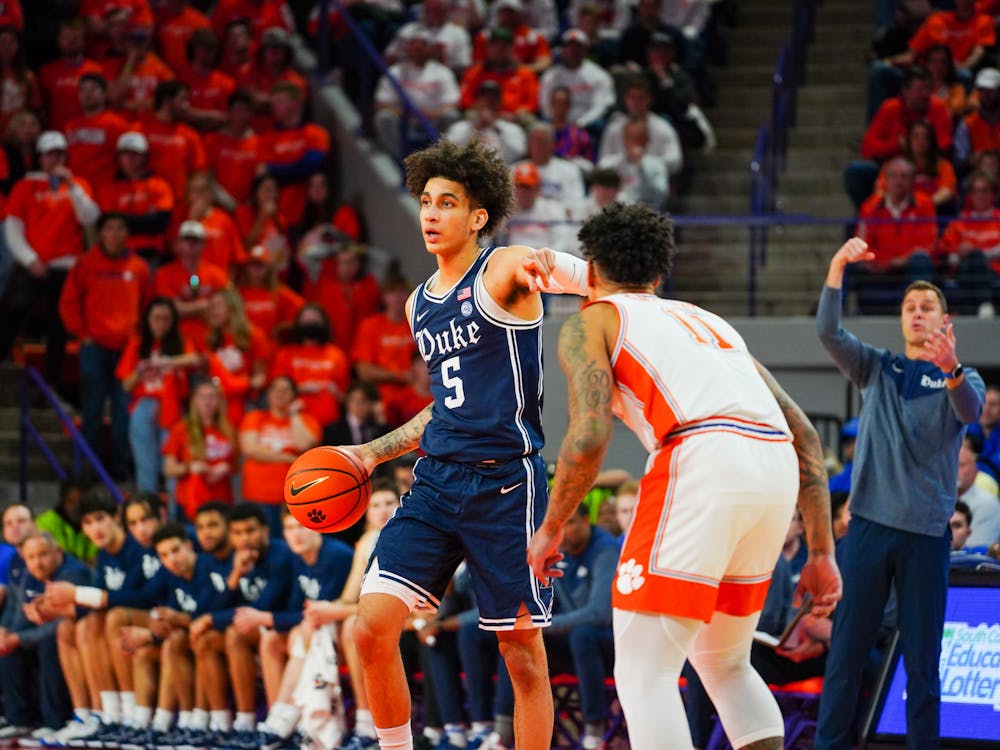CLEMSON, S.C.—No. 24 Duke’s 72-64 loss to Clemson Saturday night was a confusing affair, as has been the roller coaster of a season preceding it. One could say that comparing the wins and losses this year is like comparing apples to oranges.
Let’s twist that and instead consider the fact that both fruits have seeds, grow on trees and make excellent juices. Not as dissimilar now, right?
By this token, Duke’s season—the good results and bad results alike—has been an extended comparison between apples and oranges.
The apples? Kyle Filipowski’s scoring numbers are impressive. Dereck Lively II has proven his mettle as a defender. Ryan Young’s post play is reliable.
The oranges? Filipowski’s accuracy is often less than stellar. Lively has essentially been a non-factor on offense in spite of his 7-foot-1 height. Young’s scoring can be overshadowed by the defensive weaknesses that force him to swap in and out often rather than stay on the floor for long stretches.
When comparing these two parallels, it becomes evident that these facts are not mutually exclusive. Scoring a lot of points can happen even if someone’s accuracy falters. Someone can be good at defense and just alright or even subpar on offense, or the inverse.
Although most of the Blue Devils’ recent games may appear vastly different from each other on the results front, many of the through lines are identical. It is perhaps a different definition of the word “inconsistent”; Duke is consistent in its inconsistency, stuck in a strange limbo between a team stacked with talent and one with noticeable cohesion issues.
Against the Tigers, Duke’s defense was pretty solid, especially around the perimeter, where it limited an opponent that leads the conference in 3-point shooting to a clip of just 17.6% from downtown. Filipowski once again scored a boatload of 18 points, Lively was effective at suffocating shots and Young’s post moves continued to work. Freshman guard Tyrese Proctor even logged a career-high 17 points and was a livewire in the closing moments of both halves.
“I thought for the first 30, 35 minutes we did a really good job,” head coach Jon Scheyer said. “We missed some shots, we had to finish through some contact, but it's just learning how to score together and in what situations against really good defense.”
However, Filipowski went just 8-of-22 from the field, Lively underperformed on the boards and Mark Mitchell and Dariq Whitehead—the No. 13 and No. 3 recruits, respectively—combined for just 10 points between them. Duke lost by eight.
“[The Tigers] executed down the stretch better than we did,” Scheyer said. “They got to our realm. They've been number one in our league and 3-point shooting … on the flip side, they really got into our paint and got to our rim. That's something we need to address.”
Against Pittsburgh earlier in the week, Filipowski scored 28 points, Lively helped orchestrate a series of outstanding defensive possessions that helped tie the game, Young performed roughly the same moves in the post and Proctor proved his offensive chops. Overall, though, the Blue Devils still didn’t look convincing. And there, Duke won by eight.
The problem is not necessarily that this team or its players are streaky—that would imply that 13 wins is a fluke and streakiness is true for most players on most teams, even the good ones. Instead, the issue is that Duke often plays at roughly the same level, but that level inherently brings inconsistent results with it.
Having one or two players carrying the vast majority of the scoring burden may work sometimes (Pittsburgh), but it won’t other times (Clemson). This is the same reason N.C. State, who trounced the Blue Devils by 24, sits level with Duke on the ACC ladder: It has a couple of star performers that show up week-in, week-out with superhuman numbers, yet it has won as many conference games as it has lost.
Aside from the game against the Wolfpack and perhaps their earlier loss to Purdue, the Blue Devils have not been overwhelmingly poor in their defeats, including at Clemson. In the same vein, they have not been stellar in their wins. They’re simply playing at a middling level, and with that comes some wins, some losses, the occasional barnburner and a humbling every now and again.
Duke’s loss to the Tigers further proves that it is in purgatory; it is not quite playing well enough to topple the best, nor is it playing poorly enough for panic to set in just yet. Its performances are consistent, the results are not.
There is obviously still time to reverse this trend and find consistent consistency to supplant Duke’s current consistent inconsistency. With season-defining bouts with North Carolina, Miami and Virginia on the docket, however, this needs to happen fast.
“I felt like the group we had, we were capable of doing it tonight,” Scheyer said. “So [I’m] disappointed, and this group has to learn.”
This Blue Devil team does not lack in talent, tactical nuance or ambition—without these three things, you can’t have the No. 1 recruiting class, years of coaching experience on Duke’s bench or outwardly state your desire for a national title. Behind its current struggles, there are absolutely still the pieces to turn this thing around.
“I’ve been in this as a player and as an assistant coach where you have to learn to hate to lose,” Scheyer said. “And that's where I'm at.”
Until those pieces are put together, though, we are stuck drinking this very strange apple-orange cocktail.
Get The Chronicle straight to your inbox
Signup for our weekly newsletter. Cancel at any time.

Andrew Long is a Trinity senior and recruitment/social chair of The Chronicle's 120th volume. He was previously sports editor for Volume 119.

